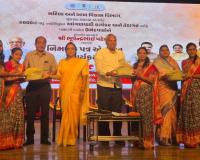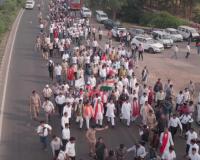Farmer in Dabhoi taluka sets example with zero-budget natural farming

Vadodara, October 6. Anilbhai Rabari, a farmer from Chhatral village in Dabhoi taluka of Vadodara district, has carved a niche for himself by adopting natural farming methods. For the past five years, he has been cultivating 20 bighas of land using a chemical-free, indigenous cow-based natural farming approach, achieving both high-quality produce and good profits.
As per agency report, Anilbhai currently has six bighas under a flourishing cotton crop and one bigha dedicated to blooming Kashmiri roses, which are the highlight of his natural farming practices. Five bighas are reserved for growing fodder for livestock, while during the kharif season, he plans to cultivate wheat on two bighas and ponk on six bighas. His farm is supported by 15 cows, including four indigenous breeds, which form the foundation of his farming model.
Sharing his experience, Anilbhai explained that zero-budget natural farming reduces input costs, increases income, and produces better quality crops that fetch higher prices in the market. His Kashmiri roses are sold at premium prices in Vadodara’s Khanderao Market due to their vibrant color and superior quality, while his cotton harvest finds buyers quickly.
Anilbhai believes that natural farming is both the need of the hour and a guarantee of a healthier future. He encourages other farmers to move away from chemical fertilizers and pesticides and adopt cow-based natural farming methods. To motivate fellow farmers, he has also initiated the free distribution of cow dung and cow urine.
The training he received under the ATMA project inspired him to take this path. He believes that natural farming benefits not only farmers but also the government and future generations. He urges farmers to visit model natural farms to learn how they can protect soil and health while increasing their agricultural profitability.





